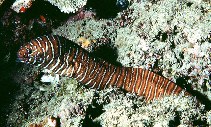| Family: |
Muraenidae (Moray eels), subfamily: Muraeninae |
| Max. size: |
150 cm TL (male/unsexed) |
| Environment: |
reef-associated; marine; depth range 3 - 50 m |
| Distribution: |
Indo-Pacific: Red Sea and East Africa (Ref. 33390) and Persian Gulf (Ref. 68964) to the Society Islands, north to the Ryukyu and Hawaiian islands, south to the Great Barrier Reef. Eastern Central Pacific: southern Baja California, Mexico and from Guatemala to northern Colombia, including the Galapagos (Ref. 9324). |
| Diagnosis: |
Dorsal spines (total): 0-0; Dorsal soft rays (total): 0-0; Anal spines: 0-0; Anal soft rays: 0-0; Vertebrae: 132-137. Close set narrow dark bands (Ref. 30404). Has close-set pebble-like teeth used for crushing hard-shelled prey (Ref. 37816). Rounded snout (Ref. 48635).
Description: Characterized by orange brown to dark brown with narrow white to pale yellow bars; body depth at gill opening 15-21 in TL; thick fleshy skin hides fins; anus posterior to middle of body; tail about one-half length of preanal length; molariform teeth in 2-3 rows in jaws, 5-6 rows on palate (Ref. 90102). |
| Biology: |
A secretive inhabitant of sandy and rocky bottoms, crevices and ledges of seaward reefs. It feeds primarily on xanthid crabs, but also on other crustaceans, mollusks and sea urchins (Ref. 9710, 48635). Benthic from 1-39 m, usually at <4 m (Ref. 58302). Possibly a protogynous hermaphrodite (Ref. 32169). Minimum depth reported taken from Ref. 30874. |
| IUCN Red List Status: |
Least Concern (LC); Date assessed: 16 August 2011 Ref. (130435)
|
| Threat to humans: |
harmless |
Source and more info: www.fishbase.org. For personal, classroom, and other internal use only. Not for publication.
